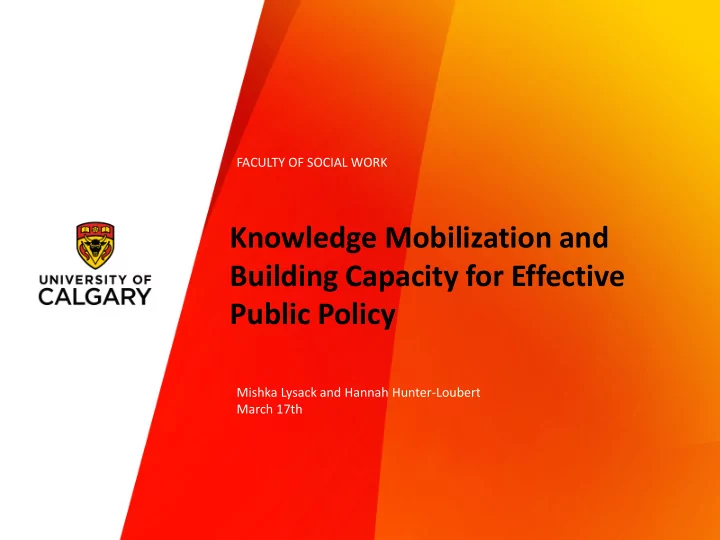

FACULTY OF SOCIAL WORK Knowledge Mobilization and Building Capacity for Effective Public Policy Mishka Lysack and Hannah Hunter-Loubert March 17th
Ladner, S. (2008). Retrieved from http://www.slideshare.net/sladner/week03- qualitative-vs-quantitative-presentation-605574
Ladner, S. (2008). Retrieved from http://www.slideshare.net/sladner/week03- qualitative-vs-quantitative-presentation-605574
???
Retrieved from IMDB.com
“Action is the antidote to despair” -Joan Baez Retrieved from http://www.joanbaez.com/Discography/JB.html
Ethical Imperative of Policy Work ACSW/CASW Code of Ethics Social work vs psychology — Sets social work apart — “PIE” DNA of the profession — Gets lost, neglected — Missed opportunity Anyone can do policy — Not segregated to work of specialists — Core aspect of social work practice
Updated from Lenton et al. (2008) PNAS 105(6): 1786-1793
Tipping Points Amazon Rainforest Boreal Forest (N. America & Russia)
West Antarctica Ice Sheet Greenland Ice Sheet Arctic Ice Sheet Permafrost
Thermohaline Circulation (Atlantic Ocean) El Nino (Pacific Ocean)
West African Monsoon South West American Drought Himalayas (water) Indian Summer Monsoon
News articles (from large PPT)
Mullalay quote – social work & policy
“The type of thinking and action which supports environmental exploitation also supports the exploitation of people” (Coates, 2003, 2)
Opportunity for Social Work Dominelli (2011), argues that social work has an important role to play: — “promoting sustainable energy production and consumption; mobilising people to protect their futures through community social work; and proposing solutions to greenhouse gas emissions” (Dominelli, 2011, 430).
— “advocacy and community mobilisation around green technologies to enhance the quality of life in disadvantaged localities…and [promoting] clean renewable energy” (435). — skills sets that include “lobbying for preventative measure taken at local…national and international levels by advocating policy changes…and dialoguing with policy makers and using the media to change policies” (437).
Examples of Knowledge mobilization and building capacity for effective public policy
Current Knowledge Mobilization Project: German Best Practices in the Energiewende
Tours — German experts — Canadian Cities (Ottawa, Toronto, Vancouver and Edmonton) — 1 week — Meetings Government policy analysts Media Political leaders University (students & academics) Business leaders NGOs
Policy Practice Skills 1. analytical skills : — collecting data — generating policy choices and options — analysing weakness, gaps — merits and strengths of policy pathways and options — developing policy proposals — Science-based Jansson, B. (2011). Becoming an effective policy advocate. Belmont, CA: Brooks/Cole.
2.political skills — building and utilizing power — exploring feasibility of action — identifying power options — developing political strategies
3. interactional skills — initiating contacts with strategic individuals and collective policy developers, decision-makers, and opinion-leaders — generating networks — building group processes — fostering and developing relationships
4. value clarification skills — identifying and rank ordering ethical and moral dimensions of the policy work in policy pathways and strategies — evaluating ethical postures of individuals and organizations as well as policy pathways and options — establishing ethical markers and “anchor points” for the reality testing of the different policy directions of parties
References Dominelli, L. (2011). Climate change: Social workers’ roles and contributions to policy debates and interventions. International Journal of Social Welfare, 20 , 430-438. Coates, J. (2003). Ecology and social work: Toward a new paradigm. Fernwood Publishing: Black Point, Nova Scotia. Jansson, B. (2011). Becoming an effective policy advocate . Belmont, CA: Brooks/Cole.
Recommend
More recommend